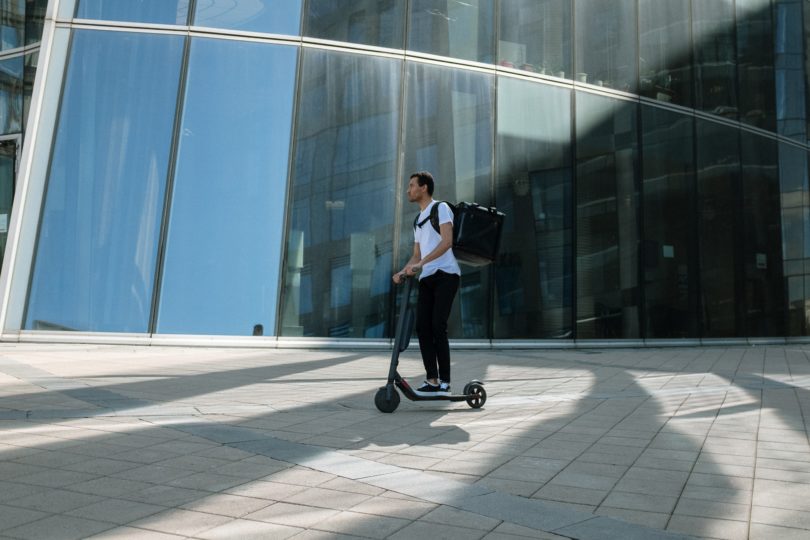Climate change is a pressing issue for global society. As business and manufacturing are one of the leading causes of pollution and global warming, many businesses may feel a responsibility to help conserve and preserve the environment. After all, the majority of Australians wish to see more action taken on climate change.
Global corporations and small businesses alike are developing and implementing sustainable solutions, from building green infrastructure to using electric scooters for adults. Business owners can find plenty of opportunities to make their products and services greener. If you are looking for eco-friendly solutions for your small business, here are seven sustainable technologies and practices you may wish to consider.
7 Eco-friendly Solutions for a Greener Business
1. Solar and Wind Energy Sources
Solar and wind energy resources are an increasingly popular solution for businesses to produce sustainable energy for offices and stores.
Many solar panels or solar roof tiles have become commercially available at affordable prices, so small business owners can invest in solar energy to provide a cleaner energy source. In the long run, solar or wind energy sources also help businesses reduce emissions and energy bills.
Although renewable energy sources depend on the weather and climate, using solar, wind, and other natural energy is more stable and distributed than regular electricity. So, you will not experience power interruptions, allowing your business to run smoothly and continuously.
2. Electric Vehicles and Micro-mobility Devices
If you have a business that uses vehicles to move around, consider using electric vehicles or electric micro-mobility devices as a greener alternative. Electric vehicles and micro-mobility devices use an electric motor instead of a fuel engine so they don’t consume fuel and emit any harmful gases. It is not only eco-friendly but also budget-friendly, especially for small businesses.
Many delivery services are starting to use electric scooters, bicycles, e-bikes, and hoverboards for short-distance trips. These micro-mobility devices can also be used by large companies in large estates to help workers travel to different areas within a facility or factory. Overall, electric vehicles and transport devices offer businesses a greener way to get around.
3. LED and CFL Bulbs
LED (light-emitting diode) and CFL (compact fluorescent lamp) bulbs are the number one choice for eco-friendly lights within homes. For businesses, using these energy-efficient light bulbs is a simple and cost-effective way to reduce your energy bill, while providing ample lights to your store or office.
Moreover, these light bulbs tend to last longer, making them a very cheap investment with huge cost savings. On the macro level, LED and CFL lights reduce energy consumption and the greenhouse gases produced by power plants.
4. Biodegradable Packaging
Packaging and shipping materials increase land pollution, and more businesses are shifting to eco-friendly packaging to reduce their impact on the environment. Instead of using bubble wrap for shipping, many use shredded paper, recycled paper, or compostable packaging to wrap products. Ultimately, reduce your plastic waste and provide eco-friendly alternatives for packaging or shipping your products.
Aside from saving the environment, providing sustainable packaging is also a good e-commerce marketing strategy to attract customers. Reports say that 74 per cent of consumers are willing to pay more for sustainable packaging. Overall, consider shifting to eco-friendly business products and packaging to reduce your waste and attract more markets.
5. Energy-efficient Data Centres
At first, computers don’t appear to be an environmental hazard, except for their hardware. However, computers, from PCs to supercomputers, consume a lot of electricity from fossil fuels. Large data centres, in particular, consume near 100MW of power, which is the same as powering 80,000 homes.
Fortunately, many data centres, such as the Google Data Centre, are switching to energy-efficient power and practices. For example, the Google Data Centre uses outside air for cooling, raises the temperature to 80°F, and builds custom servers to reduce their overall energy consumption.
For IT or data-related companies, having a more energy-efficient data centre will reduce your carbon footprint and energy costs.
6. Remote Working
The pandemic challenged companies to implement remote work setups to comply with physical distancing and lockdowns. With very little travel movement during the initial months of the pandemic, studies have shown that air pollution dropped significantly during the lockdowns. Because of this, businesses should consider making remote work an option for employees.
Working from home enables businesses to save on energy consumption and waste as fewer people use the office resources. Moreover, it saves on overall operation costs. Fully remote businesses may even have little to no paper use as most documents are stored online. Overall, remote working is a cost-effective and eco-friendly solution for businesses.
7. Eco-friendly Buildings
Many corporations construct sustainable buildings made from recycled materials. A green building aims to maintain or improve the quality of its surroundings through its construction and features. This includes building areas or features that reduce energy and water consumption and minimise pollution.
Examples of eco-friendly buildings include the Bank of America in New York City. The building reuses rainwater and wastewater, and the tower is heated by the sun. The windows are also designed for better natural lighting. Green infrastructures may be initially expensive but the cost-savings and reduced environmental impact, in the long run, make it an invaluable investment for businesses.
Why You Should Invest in Green Technologies
More businesses and consumers are becoming more environmentally conscious, which means the business landscape will soon lean towards eco-friendly practices. For businesses, incorporating sustainable products and practices will not only reduce your environmental impact but also generate better cost savings and attract eco-conscious consumers.
Moreover, providing eco-friendly products and services helps with a brand’s image. Eco-friendly brands tend to create an image of care, which helps consumers identify with the brand. Overall, expect more companies to shift their focus on creating sustainable products and services, as more consumers prefer buying from eco-friendly startups and businesses.







